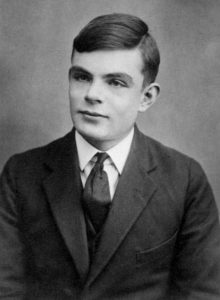To celebrate LGBTQ+ history month, we are going to take a look at important people in history who have contributed to the world in marvelous ways. This mini series will start off with the infamous Alan Turing who played a pivotal role in cracking intercepted coded messages that helped the British allies to defeat the Nazis during WW2.
Alan Turing was a British mathematician and logician born on 23 June 1912. He made significant contributions to mathematics, cryptanalysis, philosophy and to areas later named as computer science. He studied Mathematics at Cambridge University and then did his PhD at Princeton University in Mathematical Logic. In 1936, Turing wrote a paper titled “On Computable Numbers, with an application to the Entscheidungsproblem” that was recommended for publication as he showcased important findings to the emerging science of computing.
After his return to the UK from the States, Turing went on to join the Government Code and Cypher School. During the autumn of 1939 and spring 1940, Turing and others designed a code breaking machine known as the Bombe. For the remainder of the war, Bombes supplied all British Allies with large quantities of military intelligence. By early 1942, the cryptanalysts at Bletchley Park in Buckinghamshire were decoding about 39,000 intercepted messages each month, a figure that rose subsequently to more than 84,000 per month—two messages every minute, day and night. In 1942 Turing also devised the first systematic method for breaking messages encrypted by the sophisticated German cipher machine that the British called “Tunny.” At the end of the war, Turing was made an Officer of the Most Excellent Order of the British Empire (OBE) for his outstanding work and contribution in WW2.
In 1945 after the war was over, Turing was recruited to the National Physical Laboratory (NPL) in London to create an electronic computer. His design for the Automatic Computing Engine (ACE) was the first complete specification of an electronic stored-program all-purpose digital computer. However, his colleagues at NPL thought the engineering would be too difficult to execute so a much smaller machine was built, the Pilot Model ACE (1950).
NPL lost the race to build the world’s first working electronic stored-program digital computer—an honour that went to the Royal Society Computing Machine Laboratory at the University of Manchester in June 1948. Discouraged by the delays at NPL, Turing took up the deputy directorship of the Computing Machine Laboratory in that year. His earlier theoretical concept of a universal Turing machine had been a fundamental influence on the Manchester computer project from the very beginning. After Turing’s arrival in Manchester, his main contributions to the computer’s development were to design an input-output system and to design its programming system. He also wrote the first-ever programming manual, and his programming system was used in the Ferranti Mark I, the first marketable electronic digital computer (1951).
Turing was elected a fellow of the Royal Society of London in March 1951 yet his life was about to become very hard. In March 1952 he was convicted of “gross indecency”, homosexuality, which was a crime in Britain at that time—and he was sentenced to 12 months of hormone “therapy.” Now with a criminal record, he would never again be able to work for Government Communications Headquarters (GCHQ), the British government’s postwar code-breaking centre. He struggled internally with himself for a long time as society was telling him to be someone that he felt he wasn’t. He was engaged to a woman but admitted his true sexuality to her and never went through with the marriage. Sadly, he was found on 7th June 1942, poisoned by cyanide. The official verdict was suicide as a half eaten apple was found on his bedside table which he may have put cyanide inside.
Turing provided a great deal of research, innovation and strategy to the world of mathematics and computer science. Without his intellect and contributions, who knows whether we would have won the war or use computers in the way that we do now. He was a pioneer that should have had the opportunity to live his life the way he wanted and see how the foundations he built progressed and developed.
